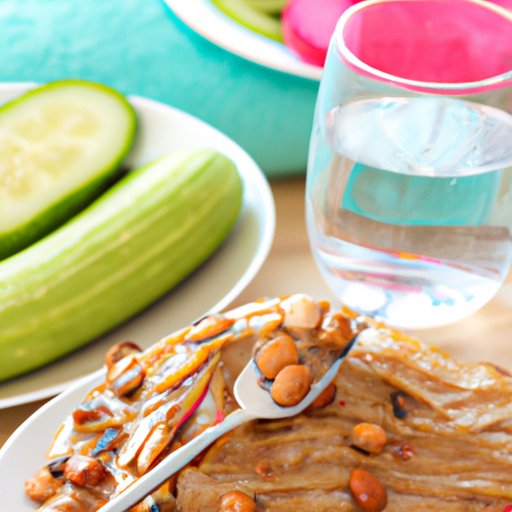
I. Introduction
Do you ever experience uncomfortable bloating or indigestion after eating? It could be due to slow gastric emptying, a condition where food travels too slowly from your stomach to your small intestine. This can cause several unpleasant symptoms and may lead to more serious health issues in the long run. That’s why it’s important to speed up your gastric emptying process. In this article, we’ll explore six proven ways to help you improve digestion, reduce discomfort, and feel better after meals.
II. Fasting
Fasting, or abstaining from food for a certain period, can accelerate gastric emptying. When you don’t eat, your stomach has time to rest and digest previously consumed food. This allows the cells in your stomach to produce more digestive juices and enzymes, which can help break down food faster when you do eat.
To effectively fast, choose a period of time when you won’t be eating. For most people, this is overnight. Aim for at least 12 hours without food, ideally 16 or more. Drink plenty of water during this time to stay hydrated. However, fasting is not recommended for people with certain health conditions, such as diabetes or eating disorders. If you’re unsure whether fasting is safe for you, consult your doctor first.
III. Exercise
Exercise is not only good for your overall health, but also helps stimulate the digestive system, including gastric emptying. When you move your body, your muscles contract and relax, which can help propel food through your gastrointestinal tract.
The best exercises for gastric emptying are those that involve moderate intensity and full-body movements, such as jogging, cycling, or swimming. Aim for at least 30 minutes of exercise per day, ideally at least three hours after eating. Be mindful not to engage in vigorous exercise immediately after a meal, as it can slow down gastric emptying and cause discomfort.
IV. Chew your food
Chewing your food thoroughly is a simple yet effective way to improve digestion and gastric emptying. When you chew, your saliva mixes with the food, breaking it down into smaller particles that are easier for your stomach to digest. Additionally, chewing signals to your body that you’re eating, which triggers the production of digestive enzymes and hormones.
Aim to chew each bite of food at least 20 times before swallowing. This may take some practice, as most people tend to eat quickly and swallow food without much chewing. To help slow down your eating pace, put your utensils down between bites, take sips of water, and focus on the taste and texture of your food.
V. Limit high-fat and high-fiber foods
High-fat and high-fiber foods can slow down gastric emptying and cause discomfort, especially in people with digestive disorders. Fat and fiber take longer to break down and can stay in your stomach for longer periods.
To speed up gastric emptying, choose low-fat and low-fiber alternatives whenever possible. For example, opt for lean cuts of meat, low-fat dairy products, and white bread instead of their high-fat or high-fiber counterparts. However, keep in mind that some types of fat, such as healthy fats found in nuts and seeds, may not affect gastric emptying as much.
VI. Hydrate with plenty of water
Staying hydrated is crucial for healthy digestion and faster gastric emptying. Water helps soften and loosen food particles in your stomach, making them easier to pass through your digestive system. Additionally, drinking water can help prevent constipation, which can slow down the overall digestion process.
Aim to drink at least eight glasses of water per day, or more if you’re exercising or living in a hot climate. Try to spread out your water intake throughout the day instead of drinking large amounts at once, as this can interfere with gastric emptying. Other drinks, such as herbal teas or low-acid fruit juices, may also be beneficial for digestion.
VII. Conclusion
Gastric emptying can have a significant impact on your overall digestive health and well-being. By following these six tips, you can speed up your gastric emptying process and reduce symptoms such as bloating and discomfort. While these tips are generally safe and effective for most people, it’s always a good idea to consult with your doctor or a registered dietitian if you have any concerns or underlying health conditions.
Remember to take it slow and listen to your body. Rome wasn’t built in a day, and neither is optimal digestion. With patience, consistency, and a bit of trial and error, you can improve your gastric emptying and enjoy a happier, healthier digestive system.




